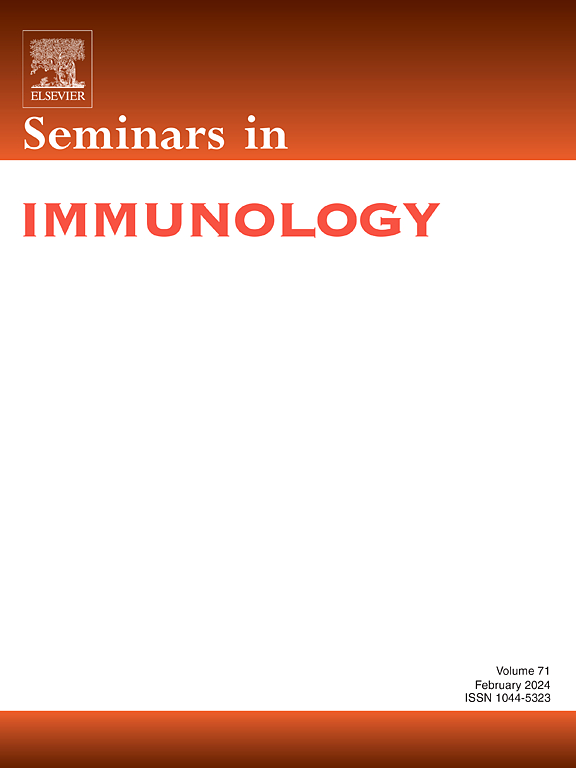乳糜泻和食物过敏的免疫治疗:进展、挑战和机遇
IF 7.4
2区 医学
Q1 IMMUNOLOGY
引用次数: 0
摘要
乳糜泻和食物过敏的管理主要依赖于严格避免饮食抗原。这种方法在现实世界的环境中是具有挑战性的,并且在食物过敏中存在危及生命的过敏反应风险。尽管它们的发病机制不同,但这两种疾病都是由对饮食蛋白质的不适应反应驱动的,这为共享治疗策略创造了机会。在食物过敏中,脱敏疗法如口服、舌下和表皮免疫疗法已经建立,辅以生物制剂如omalizumab和dupilumab。然而,诱导持续的耐受性仍然具有挑战性。相比之下,乳糜泻的治疗进展仍处于早期阶段。目前的研究重点是麸质解毒或修饰、免疫阻断或调节、耐受性途径和屏障恢复。新兴疗法,包括JAK和BTK抑制剂以及微生物组靶向干预,为这两种疾病提供了进一步的靶向治疗选择。跟踪谷蛋白特异性T细胞的生物标志物已成为乳糜泻免疫监测和症状评估的宝贵工具,尽管仍需要对患者报告的结果测量和谷蛋白挑战方案进行标准化。食物过敏试验依赖于双盲安慰剂对照的食物挑战来测量过敏原的反应性,但这些试验耗时且存在风险,并且强调了替代生物标志物的必要性。免疫靶向治疗的成功发展将需要建立一个免疫工具集,以最佳地评估两种情况下对抗原的系统反应。在临床上,由于没有明显的肠病或过敏原特异性症状,这可能会导致患者无法诊断或未经治疗的更好结果。本文章由计算机程序翻译,如有差异,请以英文原文为准。
Immune therapies in coeliac disease and food allergies: Advances, challenges, and opportunities
Coeliac disease and food allergy management primarily relies on the strict avoidance of dietary antigens. This approach is challenging to maintain in real-world settings and in food allergy carries the risk of life-threatening anaphylaxis. Despite their distinct pathogenesis, both disorders are driven by maladaptive responses to dietary proteins, creating opportunities for shared treatment strategies. In food allergy, desensitisation therapies such as oral, sublingual, and epicutaneous immunotherapy are well-established, complemented by biologics like omalizumab and dupilumab. However, the induction of sustained tolerance remains challenging. In contrast, therapeutic advancements for coeliac disease are still in their early stages. Current efforts focus on gluten detoxification or modification, immune blockade or modulation, tolerogenic approaches, and barrier restoration. Emerging therapies, including JAK and BTK inhibitors and microbiome-targeted interventions, support further targeted treatment options for both conditions. Biomarkers tracking gluten-specific T cells have emerged as valuable tools for immunomonitoring and symptom assessment in coeliac disease, although standardisation of patient-reported outcome measures and gluten challenge protocols is still needed. Food allergy trials are reliant on double-blind placebo-controlled food challenges to measure allergen reactivity, but these are time-consuming, carry risks, and underscore the need for surrogate biomarkers. The successful development of immune-targeted therapies will require building an immune toolset to optimally assess systemic responses to antigens in both conditions. Clinically, this could lead to better outcomes for patients who might otherwise remain undiagnosed or untreated due to the absence of significant enteropathy or allergen-specific symptoms.
求助全文
通过发布文献求助,成功后即可免费获取论文全文。
去求助
来源期刊

Seminars in Immunology
医学-免疫学
CiteScore
11.40
自引率
1.30%
发文量
50
审稿时长
89 days
期刊介绍:
Seminars in Immunology is a specialized review journal that serves as a valuable resource for scientists in the field of immunology. The journal's approach is thematic, with each issue dedicated to a specific topic of significant interest to immunologists. It covers a wide range of research areas, from the molecular and cellular foundations of the immune response to the potential for its manipulation, highlighting recent advancements in these areas.
Each thematic issue is curated by a guest editor, who is recognized as an expert in the field internationally. The content of each issue typically includes six to eight authoritative invited reviews, which delve into various aspects of the chosen topic. The goal of these reviews is to provide a comprehensive, coherent, and engaging overview of the subject matter, ensuring that the information is presented in a timely manner to maintain its relevance.
The journal's commitment to quality and timeliness is further supported by its inclusion in the Scopus database, which is a leading abstract and citation database of peer-reviewed literature. Being indexed in Scopus helps to ensure that the journal's content is accessible to a broad audience of researchers and professionals in immunology and related fields.
 求助内容:
求助内容: 应助结果提醒方式:
应助结果提醒方式:


